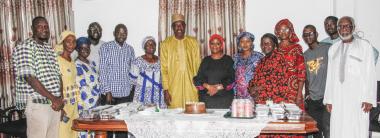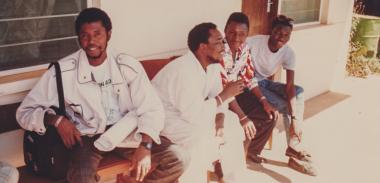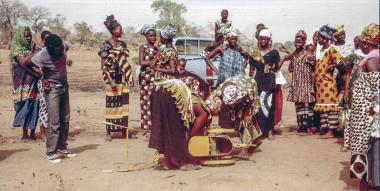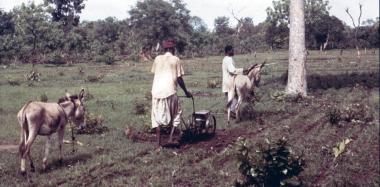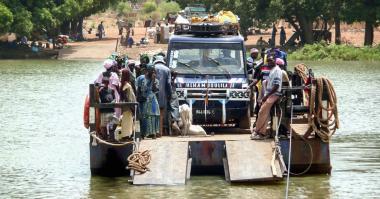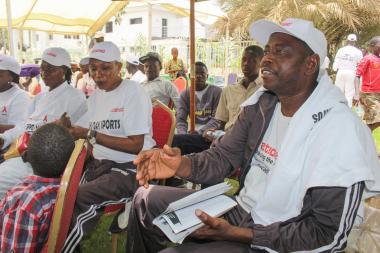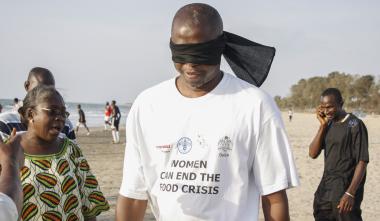ActionAid Gambia's Board and staff send farewell messages to Omar Badji
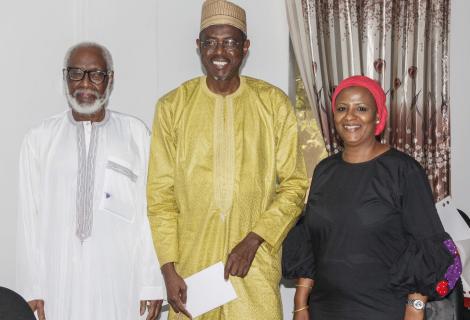
AAITG Board and staff bid farewell to Omar Badji, the outgoing Executive Director
AAITG staff and board members
Board members and staff of ActionAid International The Gambia gathered at ActionAid’s conference hall to bid farewell to the outgoing Executive Director, Mr. Omar Badji.
Mr. Badji joined AAITG about 35 years ago, precisely in 1987 and rose through the ranks up to his appointment as Executive Director in 2014. Badji succeeded Dr. Kujejatou Manneh-Jallow as AAITG’s 4th Gambian Director and the 6th Director since the establishment of the organisation in 1979.
Mrs. Haddy Dandeh Jabbi, ActionAid Gambia's Board chair, said that Mr. Omar Badji has been very supportive to the board as well as ActionAid International, and that has raised AAITG’s flag high.
Mr. Cherno A Jallow, a board member, said that he has been a board member of different organisations but what he has seen in ActionAid is very unique. The family bond that exist in the organisation is exemplary. Mr. Jallow thanked the outgoing director for his immense contribution to ActionAid, which he described as a success story.
(L-R) Mr. Cherno A. Jallow, Mr. Omar Badji and Haddy Dandeh Jabbi
Mrs. Ndella Faye-Colley, the new Executive Director, said that she is happy to come back to ActionAid. She also stated that someone like Mr. Badji with 35 years of experience in ActionAid would be difficult to replace. However, with continuous support from both the board and staff, the organisation will move further.
In his response to the goodwill messages, Mr. Badji said that during his tenure of office as Executive Director, he went through turbulent moments but was able to survive it because of the support of the board.
Badji said that if he were to go back to his useful age again, he would still choose ActionAid. He thanked the staff for their support and described them as trustworthy.
In an exclusive interview with AAITG Communications, Mr. Omar Badji recalls and delved into the early days of his career, growth, and experience in AAITG up to his retirement as Executive Director.
AAITG Comms: When did you join ActionAid, and what position did you occupy up to the time of becoming the Executive Director?
Mr. Badji: I graduated from Njala University in Sierra Leone with a BSc in Agriculture, and I came back to the Gambia in September 1986. There was structural adjustment and government had to lay off a lot of their staff. There was embargo on employment. I came home at that moment. I was with some colleagues, so we went round looking for employment.
Omar Badji (left) in his early days in ActionAid c. 1990s
We were scouting around, and somebody referred us to ActionAid. Then, ActionAid was located at Leman Street in Banjul. We went there and approached the administration at the time, and they gave us a contract for three months – October to December to do a survey. When we did that and towards the end of the year during budgeting, they made provision for three positions. We applied and I got the position of training officer. So, I started my career with ActionAid in January 1987 as Agricultural Training Officer. After a while, I was moved up to Agricultural Officer, and I was responsible for a number of agricultural assistance and through that I was promoted to become Assistant Manager for Rural Development Area.
Training of women farmers organised by ActionAid c. late 1980s
I was promoted to Development Area (DA) Assistant Programme Manager. When the position of Program Manager became vacant, it was advertised and I applied with other people. I succeeded in becoming the manager and I was responsible for the Rural Development Area (RDA) in Kuntaur. After some time, there was the position of Head of Programmes. I also contested and I became the Head of Programmes from 1998 to 2000.
By 2001, I had a scholarship from ActionAid to do my masters in UK. I spent a year in UK and came back in 2002 to the same position (Head of Programmes).
Between 2005 to 2006, I was moved to Senegal where I was managing the programme in Senegal. When I came back, I also went to Guinea Bissau where we opened an office (Guinea Bissau Programme) and I was managing it for three months and then I came back. When the contract of the former director ended in 2013, it was advertised, and I applied. I went through the interview and I was offered the position of Executive Director in 2014.
AAITG Comms: Can you give us a brief synopsis of what ActionAid was like the time you joined the organisation, and their areas of intervention?
Mr. Badji: When I joined ActionAid, we had what we called Target Areas, and we had regional officers in Soma and in Bansang. We had two units – the education unit and the agriculture unit. I was under the agricultural unit and I was posted in Bansang which was Target Area 3. At some point we thought that the word target wasn’t appropriate for our development programme. So, we changed the name to Rural Development Area (RDA). Soma was RDA 1, Kuntaur - RDA 2 and Bansang RDA 3. That was when instead of being sectoral, the programme became integrated. When ActionAid began in 1979, it was just looking at adult literacy. We realized that just focusing on adult literacy, targeting people who have missed out on education will not have much impact.
Farmers supported with draught animals - donkey and super eco seeder
We thought that if we want literacy level to increase, we really have to catch the children young and by the time they become grown-ups, they will be literate and be able to contribute significantly in the development process.
ActionAid started going into formal education and setting up schools. At some point, we realized that only education cannot help the development process. So, we went into agriculture, from there to health, so it became a big programme looking at all issues that are affecting human beings and that’s when we thought we have to go into Rural Development Areas (RDAs) instead of sectoral. So, it became an integrated programme.
The ferry provided by ActionAid to the communities of Bansang and Niani c. 1990s
After some time in 1998 - 1999, we started looking at the possibility of focusing on the rights of people instead of service delivery. We thought we need to shift and look at the possibility of creating awareness, people knowing what their rights are, strategizing and claiming those rights, and be able to engage their duty bearers. That was when we started what we called rights-based approach; later on, it changed to human rights based approach to development. That is what we are using up to now.
AAITG Comms: AATG has been in existence in The Gambia for more than four decades. What impact did the organisation have on the lives of people living in poverty?
Mr. Badji: When ActionAid came into the Gambia, then the literacy level was very low. It was also a time when women do not have much voice in terms of decision- making. When you go to a community for a meeting, it’s only the men who would come forward and respond to questions or issues. When it comes to decision- making, its only men who make the decisions, while the women and youth would just be there to support the implementations of those decisions.
A woman does not have the right to allocate land or even ownership. In some cases when they get married, they are allocated land at their matrimonial homes and those lands do not belong to them.
So, we realized that the best lands were taken by men and the women were given marginal land.
Over time, we worked with the government to build schools in various remote areas where children were not going to school. ActionAid built over 52 schools and those schools were entirely run by ActionAid. We were recruiting the teachers, training them, paying their salaries, and doing everything for them. After some time, we realized that that was not sustainable, so we had to go into an agreement with the government over a period of three years and transferred all those schools to the government. The government took over the schools, the structures and everything. For over three years, ActionAid was paying the running of those schools through the government.
Jiffarong Primary School in LRR, the first school built by ActionAid in 1980.
At the end of the three years, government absorbed the schools. Those schools are actually located in CRR, LRR and URR. These were the areas that we were working because that’s where we had remote areas where schools were not existing, and children were not going to school. Illiteracy level were very high. But now we can boast of schools in every corner of the country in the remotest places and some of them are established by ActionAid. So, ActionAid contributed towards the literacy of this country.
In terms of women and youth being central players in decision-making, we have done a lot in that area. When we started, we were focusing on women, and it was deliberate because of traditional issues where women have been marginalised over a long period of time. It went to a point when women accepted that that’s where they should be in society. So, we had to create awareness for women to understand that they have a central role to play in decision-making, whether it’s at the household level, community or even at national level. We also have to make men understand that women’s contribution to the development process, is helpful for the country, the household and the community.
Things started changing gradually. You go to a community, women have become very active and even can stand up and challenge men. Even in a public gathering or meeting, women were coming forward and contributing significantly in terms of decision-making. We went to the point where we took up the issues of women being members of the district tribunals because for a long time, district tribunal members were only men. So, we realised that that was not proper. For instant, if a woman is raped and she has to go to the tribunal, she goes and face a panel of men. It can really be painful for a woman to go and talk to men about what she has experienced in terms of rape. Matrimonial issues were also settled by men only. So, we thought that’s not really correct.
Then we embarked on a campaign for the inclusion of women in district tribunals. Now I’m happy to say that there are some district tribunals with women as members. Those tribunals have seen the change in terms of the quality of their judgements, particularly when it comes to matrimonial issues.
We also feel that youth are marginalised. So, we are very active in terms of working with them to make sure that they are active in decision-making, as well as political participation. Both women and youth have to be active in politics and vie for elective positions. They now are contesting for Area Council and National Assembly positions. So, women and youth are really going into those areas, and we have contributed towards all that as an organisation.
For me, I am very proud of those achievements where we see women and youth coming forward and speaking out, challenging, and actively engaging in processes that they were not part of a few years ago.
AAITG Comms: The organisation went through different phases and strategic shifts. Collaboration and partnership had expanded over the years with the implementation of different projects funded by the EU, UN Agencies, and other international organisations. How has those collaborations or partnerships contributed and strengthened AAITG’s work?
Mr. Badji: When ActionAid started, it depended entirely on Child Sponsorship (CS). That was a kind of partnership between individual sponsor in UK, because that was where ActionAid started. Overtime, CS spreads to other areas in Europe. We are also doing it in Brazil because it’s now coming to the South. That was the only source of income for funding our programmes. But then at some point we thought we need to diversify our funding base. Then we went into developing proposals and marketing those proposals.
In terms of partnership for funding, we have very critical donors, and the European Union (EU) is one of them. They have funded quite a number of programmes that we have implemented. Global Fund too is very critical indeed. They have been very supportive donor in the area of fighting against HIV and AIDS, and the area that we have taken up as ActionAid is actually in the preventive aspect trying to prevent the spread of HIV and AIDS in the country.
Omar delivering a speech at the launch of the EU-funded project on promoting Women's socio-economic Rights in 2014
We have other donors like Amplify Change who actually funded our programmes towards fighting against gender-based violence, and we work with the Network Against Gender Based Violence (NGBV) in that area.
We have a donor also in Sweden called Shifo Foundation where we look at issues of childbirth registration and the services that go in for children immunization to make sure that the time taken to do all those services reduce, so that health workers are able to engage in other issues, and parents spend less time in taking their children for immunization.
We have other donors some of them are individual donors from UK and Italy that have supported us. Every five years, ActionAid develops a Country Strategy Paper (CSP). Our child sponsorship alone cannot give us the resources that we need to implement our CSP. So, the funding we received from those donors have gone a long way towards helping us realize the goals of the CSP, in improving the quality of life and livelihoods of people in this country, in the areas of HIV and AIDS, health, income generation, agriculture, particularly climate change issues and migration problems.
The EU have been very supportive to manage migration and the impact of climate change on the lives and livelihoods of people.
We have created a network where ActionAid, the Catholic Relief Services (CRS) and the United Purpose (UP) come together to form a consortium to focus on supporting communities in realizing their aspirations. Other than that, we have also worked with other partners like Child Fund, Njawara Agricultural Training Centre (NATC) and the National Coordinating Organization for Farmers Association in The Gambia (NACOFAG).
Omar presenting atthe Management retreat in 2016
In country, we have donors like the UNDP, FAO, UNFPA, UNICEF and WFP. These organisations have been very helpful in terms of working with us in sharing skills, knowledge and experiences, and also providing the resources to help us in funding some of our programmes.
AAITG Comms: You have served as Executive Director of AAITG for nine years, and a lot of successes have been registered. What is or are key things that you will always remember about ActionAid?
Mr. Badji: ActionAid as an organisation, whether it’s in country or globally, has a very conducive working atmosphere or environment, which I like very much. That could be the reason why I have remained in ActionAid for this long.
I like the democratic nature and the promotion of the human rights issues in ActionAid. We have to be democratic in everything that we do. When it comes to decision-making, no single person should take decision. Everybody within the organisation should be given the space, the opportunity, and the support to be able to contribute. Whether you are a director, a security or a cleaner, we all have equal rights in terms of decision-making. That is one thing that will make people open up and be able to support the programme to move forward.
Omar at the Workers Day Celebration in 2015
The other thing is the realization that we can’t do it all, and we must partner with others to be able to do the work. I think that is also a great thing and over time, we have tried to do that and that’s why we had to go into those formalisation of forming a consortium between CRS and UP. Through that, we were able to do a lot in responding to disaster affected communities and working on supporting the Farmer Field Schools (FFS).
In addition, working on the issue of migration, strengthening our organisations to be able to manage migration properly, are things that when I look back, I feel satisfied.
The campaign on the inclusion of women in district tribunals is not just about headcount to say we have three or four or ten women in the district tribunal, the focus for us is about the women’s understanding of their role as members, and building their capacity on basic issues that they need to understand when they get into the district tribunal so that their contribution is meaningful.
If you look at the values of ActionAid, they are beautiful values. For instant, the value of mutual respect is very important because in any organisation where there is no mutual respect, it can be very frustrating. The issue of contribution and effective participation cannot come if there is no mutual respect. Secondly, humility for me, is very fundamental because if we have to work with the community, we have to be simple and down to earth. If you go to the communities and you think you are above them, it’s going to be difficult to work with them.
ActionAid being an organisation which respects people, and focusing on their rights, ensuring that everybody has equal opportunity, creating a conducive and democratic space for people to participate in decision-making, I think those are things that are very satisfying, and need to strengthen.
Omar blindfolded in an exercise at AAITG's staff retreat in 2013
AAITG Comms: As your tenure of office comes to an end, what final message do you have for AA staff, partners and donors?
Mr. Badji: As ActionAid staff, we need to be team players. For us to be efficient as an organisation, we need to work as a team. It’s good to understand that there is a difference between a group of people working together and a team of people working together. If we are a group, we can be together, but we have different objectives. But as a team, we know we have objectives that we are all working towards. So, we must have that in mind and make sure that we mutually support each other.
As an organisation, we have to be aggressive in terms of raising the resources that we need to be able to implement our CSP. The CSP is the key policy document for ActionAid, and it is the document that sets the direction for the organisation. So, we need to have the resources that we need and for those resources to come, it should not be in the hands of a single person.
For the donors, it would be an appeal to them to understand what we are doing, our focus and the impact of the work that we are doing and be able to support in terms of funding our activities. Because without the resources, it will be extremely difficult for us to be able to achieve what we want. The focus of ActionAid if you look at it closely, it’s about building people’s capacities to be able to live sustainably within a very dynamic world, a world that is changing on a daily basis.
To the other partners, no single organisation can do it all. Not even government. Government is a powerful institution, and they have the human resources, but they cannot do everything alone. So, we need to work together in partnership and be able to deal with the issues in a more focus and impactful way, rather than working individually.
We should be looking at how to solve the health, education, food security and other problems of the country, rather than ‘how do I as a single organisation...’ That is not possible. So, we need to be humble enough to say: ‘I can’t do it all alone, I need somebody else’s support to be able to achieve what we want’.
Thank you very much Mr. Omar Badji, and on behalf of AAITG staff, we want to thank you so much for your 35 years of service to ActionAid. We wish you success in your future endeavours.
Mr. Badji: Thank you very much.
